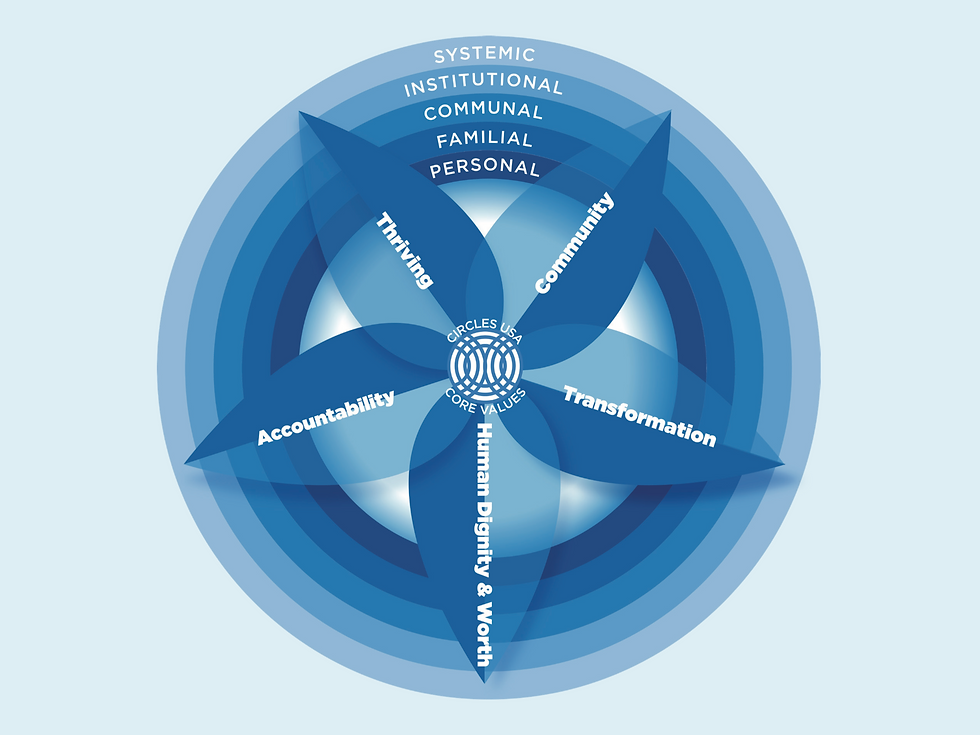Q&A with Jamie Haft, Circles USA’s New Executive Director
- Sep 30, 2019
- 4 min read
Updated: Oct 7, 2024

This summer, Jamie Haft was appointed Executive Director to manage the strategic planning and operational functions of the organization. Scott Miller is continuing as Founder, advancing key partnerships and research. With a model of collaborative leadership, added capacity will expand our growing network of 70-plus locations reducing poverty. Here’s our Q&A with Jamie, who served as our Deputy Director for the last year.
What’s your personal connection to this work?
I vividly remember the first time I witnessed global poverty. I was 20 years old and had won a college scholarship to study in India. When I arrived in Mumbai, I saw a station so crowded that people were riding on the outside of the train cars, gripping for their lives. Our guide explained how workers needing money must reach their city jobs at the expense of their safety. I felt sick sensing the desperation of their circumstances, and so I wanted to dedicate myself to addressing the suffering caused by poverty.
Why was I born into a life with access to education, among other freedoms, while others are struggling to get by? Growing up, my family often discussed inequality. My grandfather, Harry Haft, was violently persecuted during the Holocaust before emigrating to the United States. In my Jewish culture, there is an imperative to repair the world, called tikkun olam. After college, I became a community organizer and worked in communities across the United States, which eventually led me to Circles.
What’s your favorite aspect of Circles?
The relationship between Circle Leaders and Allies is so important. During a difficult time in my own life, I could not imagine a way forward, but I was fortunate to have allies who listened to me and encouraged me to find new strength. That’s why I’m passionate about experiences that expand our imagination about what’s possible for our lives. I appreciate that the goal in Circles is to create heart-felt relationships and personal growth for all involved.
Plus, community leaders are empowered through Circles to tackle the systemic issues that prevent people from getting out of poverty. They are pursuing solutions to the chronic problems of affordable housing, childcare, transportation, healthcare, financial literacy, the cliff effect, and quality jobs. Through Circles, people expand imagination about what’s possible for their community’s future.
How will you approach the job of Executive Director?
I’ve been influenced from studying the U.S. Civil Rights Movement and especially Ella Baker’s philosophy: humbly listen to those doing the work and support them into positions of power. In that spirit, my priority is to listen closely to Circles USA’s longtime members and partners and see what our office can do next to support them. My role is inviting dialogue, bringing what’s heard into a shared vision, and directing operations to meet our collective goals.
Our Chapters have been the heart of this organization for 20 years, and we will soon launch new multimedia tools and training programs. In the coming year, I’ll focus on enabling Chapters to become Regional Hubs. Additionally, I’ll continue developing our pilot Poverty Reduction Lab initiative, which is already leading systemic change in three states.
What has surprised you about Circles USA?
I was thrilled to discover Circles USA’s attention to changing the narrative about poverty. My bachelor’s degree is in theater and my master’s degree is in public relations, so I want to draw on this experience to gain a national commitment for ending poverty. As Founder, Scott Miller’s books and methods have called for the eradication of poverty so that everyone has enough money, meaning, and friends for a sustainable future. I’m excited to collaborate with a new generation of leaders to expand this call with as much urgency and creativity as possible. To do so, I’m developing a communications campaign with leaders from Circles and our partners. We will create multimedia publications about how solving poverty also solves problems with the economy, health, justice, and the environment. We will offer our success stories with practical strategies for reducing poverty rates across North America.
What are some of your ideas for Circles USA’s future?
Most important to me is supporting leadership throughout our network. For Circles USA to adequately build an inclusive community for ending poverty, I believe the organization must reflect this country’s cultural diversity, with attention to ethnicity, gender, age, geography, disability, and sexual orientation. The Haas Institute’s framework of Othering and Belonging is a great resource. As an activist for LGBTQ+ rights, I am acutely aware of the need to provide safety, visibility, and economic opportunity to those who have been marginalized in our society.
I’m proud of how we incorporated these values into the recent development of our new multimedia training materials for Circle Leaders and Allies. Because our 2018 Impact Report revealed that 79% of Circle Leaders identify as female, we added new content about gender equity. We also added new content on structural racism and white privilege in support of race equity.
Long term, I want Circles USA to more intentionally address issues facing women, survivors of domestic and sexual violence, people of color, indigenous, and LGBTQ+ communities. Let’s have Circle Chapters and Poverty Reduction Labs created with, by, and for these communities. We’re currently establishing relationships with new partners who are committed to social justice. Our upcoming Leadership Conference – October 14-17 in Greenville, SC – will feature some of these organizations. I’m looking forward to meeting you there!
To share your aspirations for the organization’s future and to get involved, contact jamie@circlesusa.org.




Comments